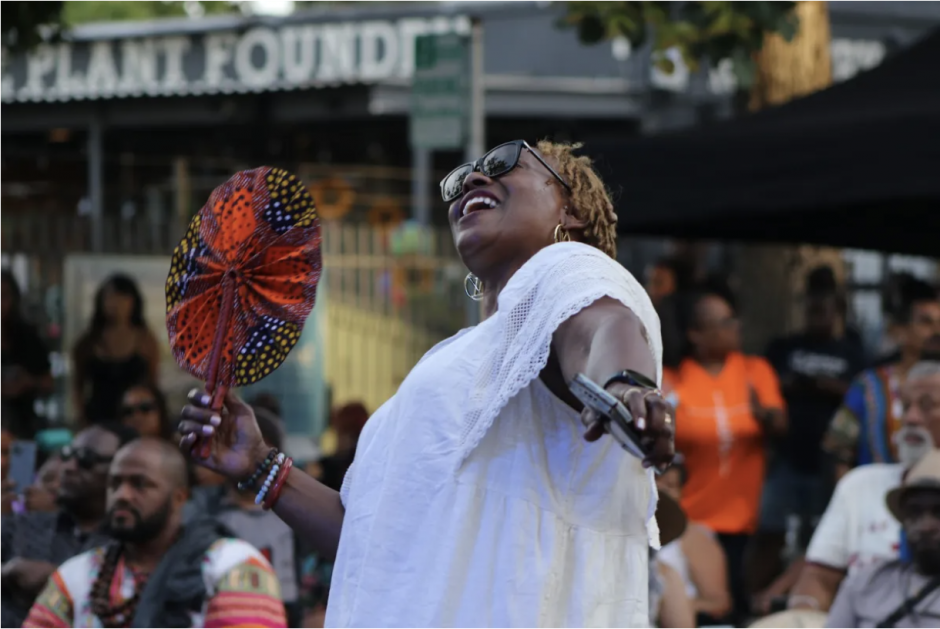Thousands Dance In The Street For Juneteenth
Third Annual Block Party Held At 40 Acres In Oak Park
Thousands danced in the streets of Oak Park at St. Hope’s third annual Juneteenth Block Party at the 40 Acres Complex on June 17.
A stage sat in the middle of 34th Street, closing the road in front of Underground Books. Attendees in lawn chairs vacated their seats when the DJ played the Cupid Shuffle, gathering around the stage to do the line dance akin to the Electric Slide.
Entertainment for the free event included barber battles, youth dance teams, gospel choirs, and a headlining performance from Sacramento’s very own Club Nouveau. When not watching the show, attendees perused over 50 mostly-Black vendors selling art, clothes, food, and more.
Cassandra Jennings, CEO and president of St. Hope, was introduced by comedian Dru Burks who emceed the event. He called Jennings “family,” before she took the mic.
“Certainly we are family, and all of you are my family too,” Jennings said from the stage. “Today is our celebration of the freedom of our people.”
For some Black folks, Juneteenth is the only independence day worth celebrating. Keon Johnson, 44, showed up and showed out for Juneteenth but doesn’t celebrate the Fourth of July; he said that holiday “means nothing.”
“I know where my ancestors were in 1776,” Johnson said of the day the Declaration of Independence was signed while Blacks remained in shackles. “Juneteenth is a remembrance of our ancestors who lived the struggle in that time.”
Since becoming a federal holiday in 2021, Juneteenth celebrations have erupted around the country. But southern states have celebrated the holiday for more than a century.
June 19, 1865, or “Juneteenth,” celebrates the day the enslaved Blacks in Galveston, Texas – the last of the Confederate states to have emancipation enforced – were freed from chattel slavery. It is the chosen day to celebrate the fall of chattel slavery in the United States.
Danielle Johnson is a native Sacramentan who said she’d never “seen so many beautiful Black people in one place.” She said it was important for the Black community to celebrate the perseverance of those who came before them, but also said there’s a long way to go.
“It’s a reckoning of a very dark moment in our history,” said Danielle, who has a bachelor’s in African American studies. She cited police brutality and the continued subjugation of Black queer and trans folks before saying Juneteenth “doesn’t mean freedom, I’ll tell you that.”
Her statement was astute in more ways than one. While Juneteenth celebrates slavery’s abolition, it didn’t actually end in June 1865. The Emancipation Proclamation only applied in Confederate states; the 13th Amendment officially abolished slavery in the United States, freeing enslaved Blacks in Delaware and Kentucky.
Jay King, CEO and president of the California Black Chamber of Commerce, said that until the nation tells the truth about American history, it cannot atone for its past.
“This celebration is a reminder that there is a debt owed for crimes that were committed against us post-slavery,” King said. He explained that although the 13th, 14th and 15th amendments gave Blacks freedom, citizenship, and the right to vote, the government still “broke laws and participated in crime against us simply because we’re Black.”
Alex Sanders found out about the celebration earlier in the day while at the farmers market. He grabbed his kids, 9-year-old Aaleyah and 8-year-old Eli, and booked it to 40 Acres. The kids bounced in the jump houses, got their faces painted, marveled at balloon animals and played with other kids.
Sanders said it was important for his kids to celebrate.
“They know what happened,” Sanders, 36, said. “We can never forget but I don’t want them to dwell on it. I just want them to see the positivity.”
There are more ways than one to commemorate Juneteenth. Some Black folks take the time to brush up on the history, others revel in the camaraderie, and many do both.
For King, learning the history is a source of Black joy.
“You’ll walk around proud because you’ll know how resilient you are,” King said. “And that’ll put love in our hearts and give us power.”

